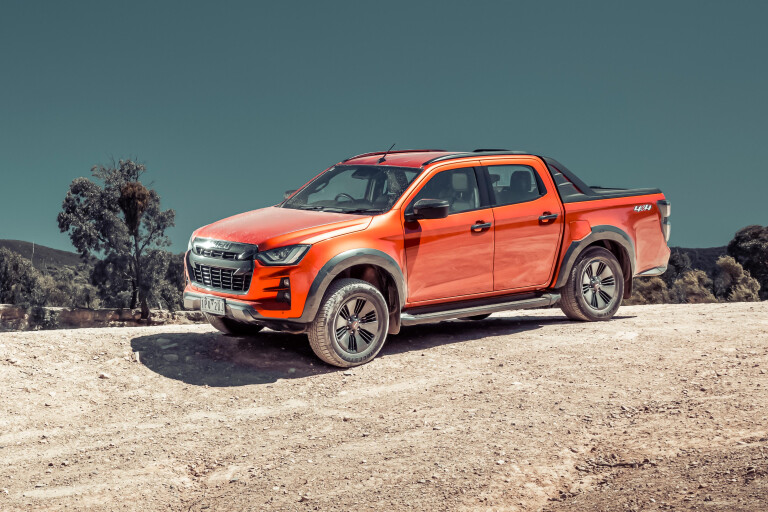
Score breakdown
Things we like
- Active safety equipment
- Grunty engine
- Much improved dynamics
Not so much
- Noisy engine
- Piano black trim attracts dust
- Can struggle in tough off road scenarios
The Isuzu D-Max X-Terrain is proof of the grander ambitions the brand has for the latest generation of its popular dual-cab ute.
Long regarded as a dependable workhorse, the D-Max now has a flagship X-Terrain variant that adds a bit of a style and a whole heap of convenience in an attempt to lure buyers out of Rangers and HiLuxes.
Differentiating it visually are plenty of charcoal highlights, including the grille, wheelarch extensions, mirrors, wheels, door handles and roof rails, as well as a roller tonneau, sports bar and underbody spoilers front and rear.
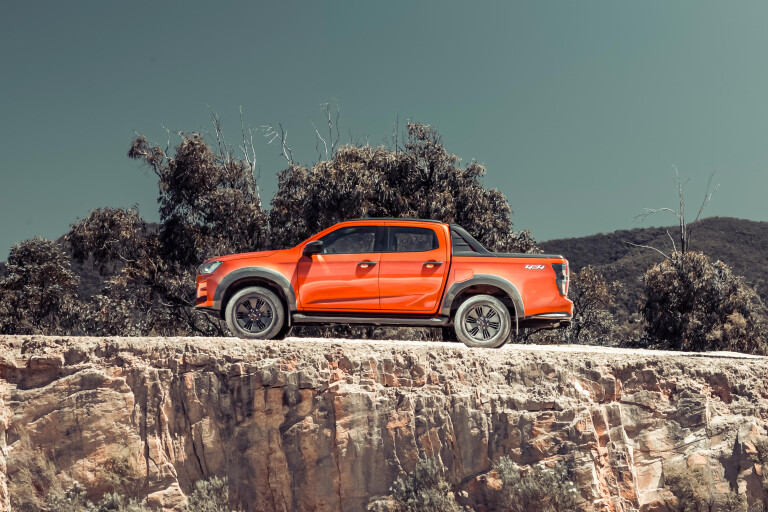
What you can see are auto-levelling LED headlights and taillights, while what you can’t see are steel plate guards for the engine sump, transfer case and leading edge of the fuel tank. Eight colours are available, including the X-Terrain exclusive Volcanic Amber metallic you see here.
It has an angry, Predator-like face, though a more aggressive wheel and tyre package would help as the 18 x 7.5s wrapped in 265/60 Bridgestones look a little undernourished when compared to the likes of the Ranger Raptor and Navara Warrior.
As you’d hope for a range-topping offering listed at $63,900 before on-road costs, the X-Terrain is packed to the gills with equipment.
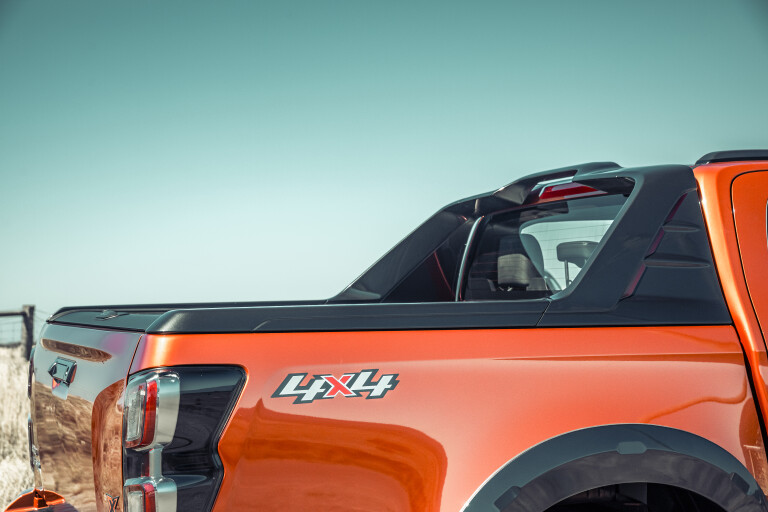
Where the D-Max moves the dual-cab game on is with its impressive suite of safety systems
The interior itself has some nice touches, such as the row of silver switches for the HVAC, a storage cubby atop the dash and a large 9.0-inch multimedia touchscreen, but the leather feels shiny and slippery, there’s plenty of hard plastic present and the piano black inserts are a magnet for dust and dirty fingerprints.
Finding a comfortable driving position is aided by an eight-way electrically adjustable driver’s seat and rake/reach adjustable steering wheel, but the seats themselves are flat with quite a short base that lacks thigh support.
The infotainment’s larger size is handy and it’s relatively straightforward to use with shortcut keys below, but glare can make it difficult to see in certain lights and wireless smartphone mirroring (Apple CarPlay and Android Auto) is less useful when the lack of wireless charging means your phone will likely be plugged in anyway. Re-connection sometimes took quite a long time, too.
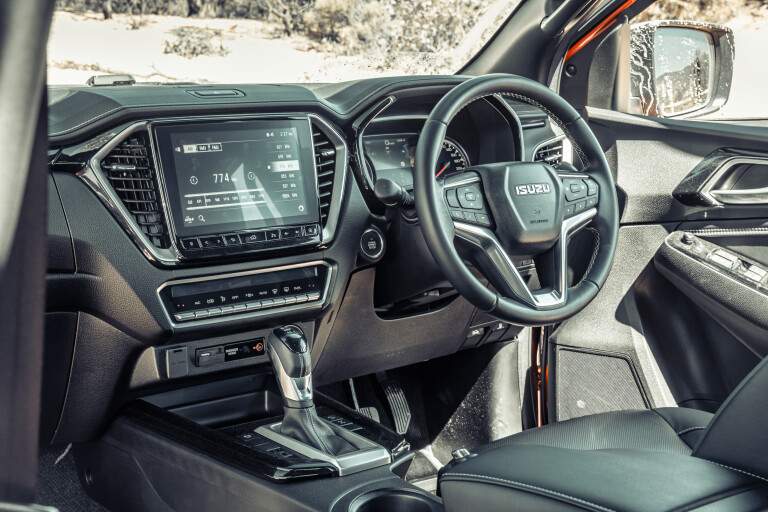
In the rear there’s space for three across and there are vents and large door pockets that accept 1.5-litre bottles, but the single USB port could start arguments if devices are running low. There’s a pair of child seat tethers and extra storage space both underneath and behind the flip-up rear seat.
Smart keyless entry with push-button or remote start is handy while cabin temperature is handled by dual-zone climate control, tunes broadcast through an eight-speaker stereo and there’s native satellite navigation if smartphone mirroring isn’t your thing.
Where the D-Max moves the dual-cab game forward is with its comprehensive active safety offering right across the range. Deep breath, here we go.
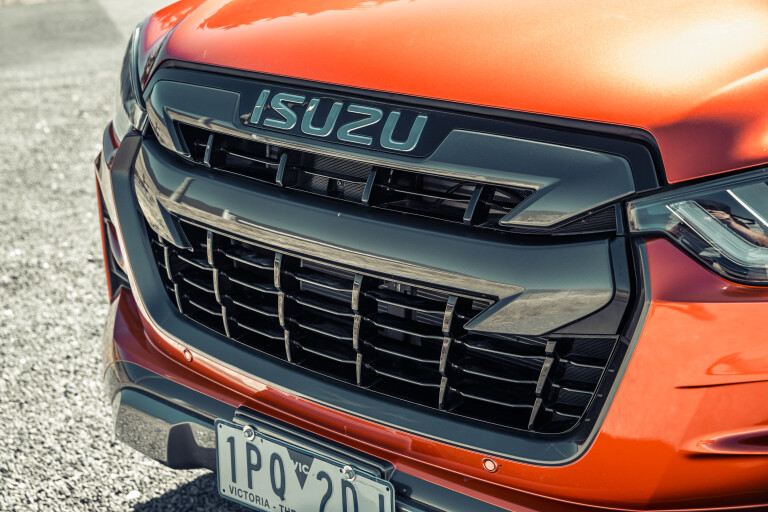
Like its lesser siblings, the X-Terrain incorporates autonomous emergency braking, turn assist, post-collision braking, forward collision warning, misacceleration mitigation, adaptive cruise control with stop & go function, traffic sign recognition, lane departure warning and prevention, blind-spot monitoring, rear cross-traffic alert, front and rear parking sensors as well as eight airbags.
Isuzu’s after-sales support is also impressive, with a six-year/150,000km warranty, seven years of roadside assistance as long as you service with an approved dealer and seven years capped-price servicing, with services required every 12 months or 15,000km.
Before we hit the road, the X-Terrain’s tub is 1570 x 1530 x 450mm (length, width and height) with 1122mm between the wheel arches, but the roller tonneau robs it of significant cargo space and there are only two cargo tie-down points instead of the four on lesser D-Maxes.
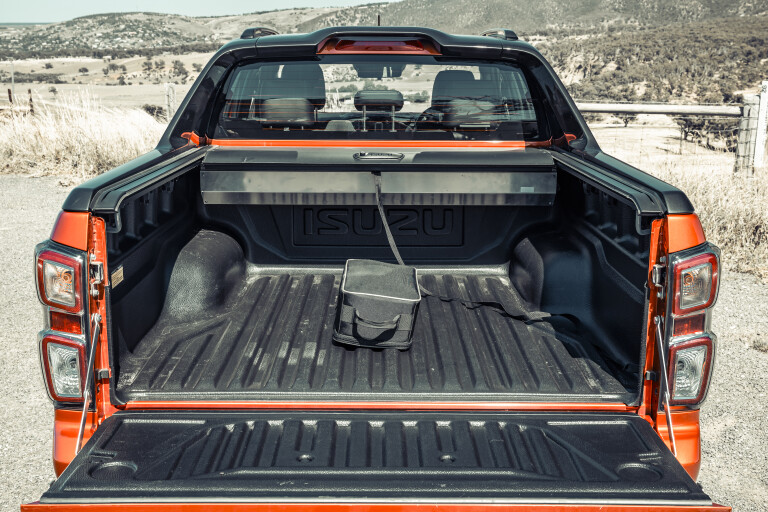
A 3100kg Gross Vehicle Mass provides a 970kg payload, though the 5950kg Gross Combination Mass then limits towing capacity to 2850kg rather than the 3500kg rated maximum.
The D-Max is known for its strong powerplant and the latest generation does little to dispel that notion. Its 140kW/450Nm 3.0-litre turbocharged diesel has a solid hit of low- and mid-range torque that gives it impressive towing and off-road performance, though it’s noisy in its operation.
While the six-speed auto works well, a couple more gears wouldn’t go astray to make better use of the relatively narrow power band, the engine having done its best work by 3600rpm, which is the point at which peak power arrives. Fuel consumption is claimed to be 8.0L/100km on the combined cycle, our test number hovering slightly above that at 8.3L/100km.
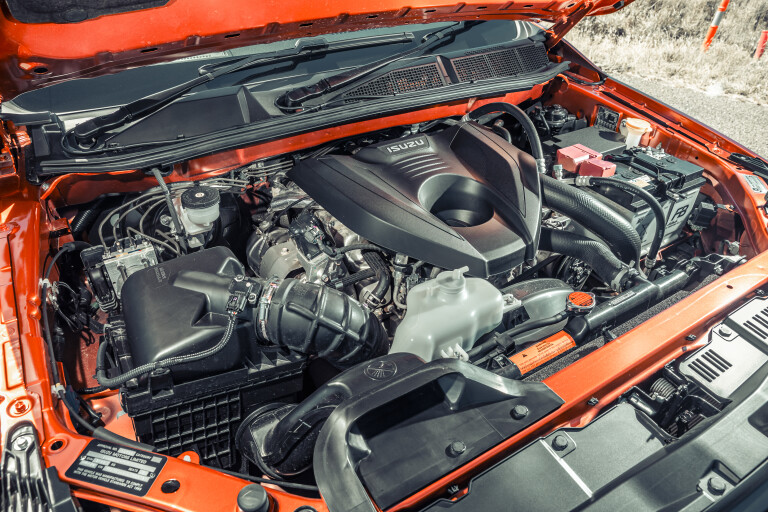
Rear-wheel drive is the default drive mode. While there is the ability to switch to 4H on the move at up to 100km/h, the lack of a centre diff means this should only be done on unsealed surfaces. A limited-slip differential would improve traction on slippery surfaces when driving in rear-wheel drive.
Selecting 4L requires a stop and the selection of neutral, but it engages quickly on most occasions. This latest D-Max now includes a rear differential lock but it’s only available up to walking speeds and also cancels the traction control.
The standard highway-terrain tyres also limit the X-Terrain’s ability off road, but check out the review from 4x4 Australia for a full rough stuff run down. On the plus side, the more road-focused tyres help the D-Max deliver impressive sealed-surface braking performances.
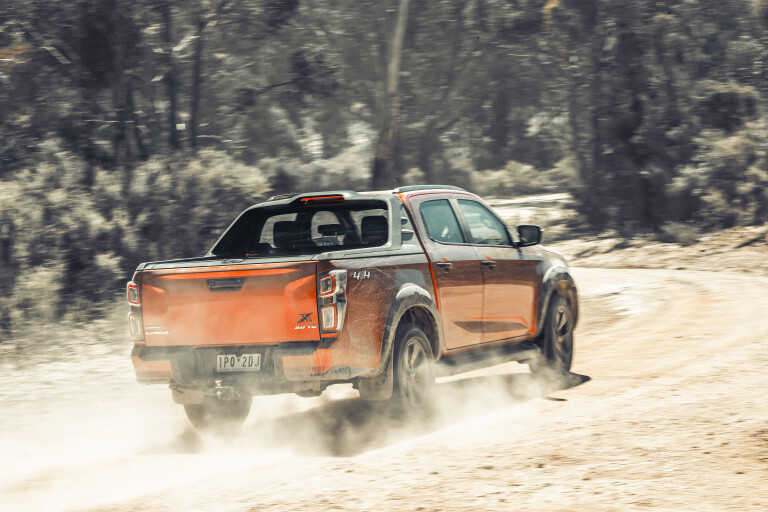
Speed-sensitive steering allows for little effort at parking pace – useful when the slow steering requires plenty of twirling – while increasing in heft at higher speeds to increase connection. Like most dual-cabs, communication isn’t a strong point but its driving manners are better than most of its competitors, if not up to the standards of the Ranger and Amarok.
Its ride is comfortable enough in most circumstances given its leaf-sprung rear end, absorbing most bumps but with quite a lot of vertical movement over larger undulations at higher speeds.
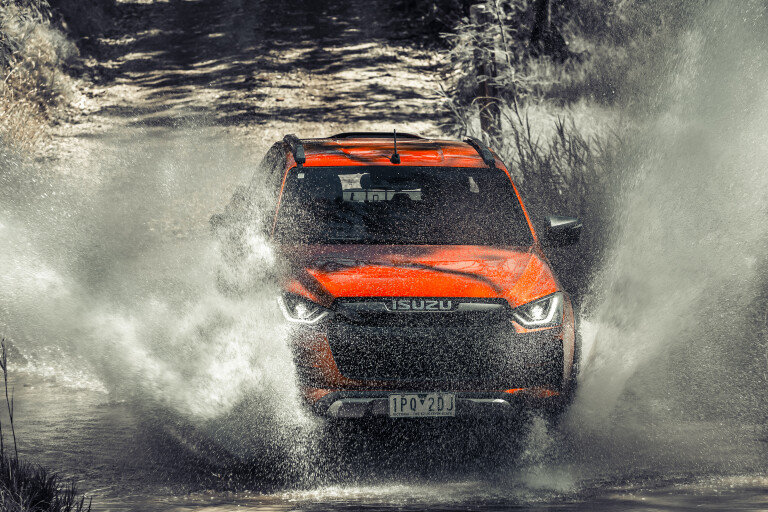
All in all, the D-Max X-Terrain is one of the better dual-cab offerings on the market, as evidenced by its second-place result in our recent ute mega test. It’s a big step forward over its predecessor, with improved road manners, benchmark safety and plenty of equipment.
There’s room for improvement off road but a decent set of appropriate tyres would go a long way to rectifying that. The dual-cab segment is an ultra-competitive one, but Isuzu’s efforts with the D-Max have propelled it towards the top of the class.
| Body: | 4-door, 5-seat ute |
|---|---|
| Drive: | rear-/all-wheel |
| Engine: | 2999cc inline-4cyl diesel, DOHC, 16v, turbo |
| Bore/stroke: | 95.4 x 104.9mm |
| Compression: | 16.3:1 |
| Power: | 140kW @ 3600rpm |
| Torque: | 450Nm @ 1600-2600rpm |
| 0-100km/h: | 10.1sec (tested) |
| Fuel consumption: | 8.0L/100km (combined/claimed) |
| Weight: | 2130kg |
| Power/weight: | 66kW/tonne |
| Transmission: | 6-speed automatic |
| Suspension: | Double wishbones, coil springs, anti-roll bar (f); leaf springs (r) |
| L/W/H: | 5280/1880/1811mm |
| Wheelbase: | 3125mm |
| Tracks: | 1570mm (f/r) |
| Steering: | Electrically assisted rack-and-pinion |
| Brakes: | 320mm ventilated discs, 2-piston calipers (f); 295mm drums (r) |
| Wheels/tyres: | 18 x 7.5-inch (f/r); 265/60 R18 Bridgestone Dueler H/T 684II |
| Price: | $63,900 + ORC |
Score breakdown
Things we like
- Active safety equipment
- Grunty engine
- Much improved dynamics
Not so much
- Noisy engine
- Piano black trim attracts dust
- Can struggle in tough off road scenarios

COMMENTS